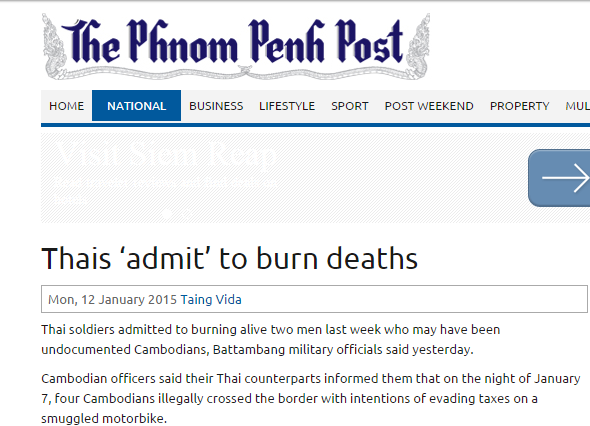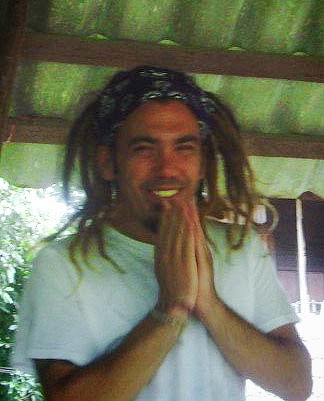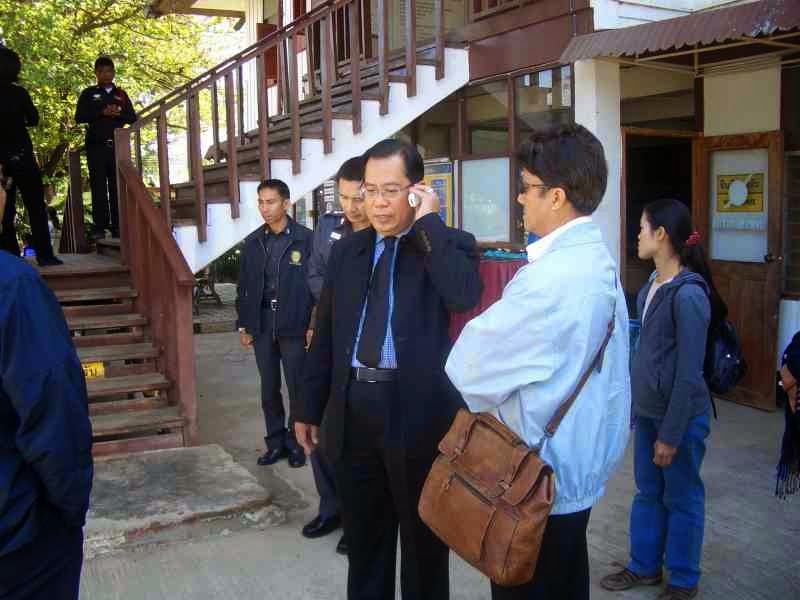New plans will hinder murder enquiries too
For those who have not noticed the current Thai military led government has been quietly curtailing basic human rights and the ability of organisations to question government and official conduct.
People have already seen how under Thailand’s new government police officials simply declined to turn up to answer questions from the TNHRC about the murders of Britons Hannah Witheridge and David Miller on Koh Tao.
In the case of Leo del Pinto, the 24-year-old Canadian from Calgary who was murdered by a Thai policeman in Pai, Mae Hong Son, the policeman would never have gone on trial had is not been for the fact that the case was taken up by the the Thai National Human Rights Commission and passed on to the DSI for action.
In that case, police in Pai attempted a total cover up to protect the policeman killer. Witnesses were intimidated. But even so police sergeant Uthai Dechachiwat was allowed bail while awaiting trial – during which time he also murdered his 18-year-old bride of two weeks.
Proposed government legislation is a licence to cover up.
More recently complaints have been made that the Thai military has been shooting on sight Cambodians illegally crossing the border – or and when they miss – catching them and burning them in rubber tyres.
 |
| The Thai Army denied this report in the Phnom Penh Post – but the killings along the Thai-Cambodian border are so frequent as to discredit blanket denails. |
Today Human Rights Watch calls on the military to not to abolish the Human Rights Commission.
But first for those who do not remember:
On 25 October 2004, a demonstration of around 1,500 people gathered in front of a police station in Tak Bai to protest the detention of six men. Several hours into the protest, the crowd attempted to cross the police barrier into the station. Police responded with tear gas and water cannon, and the crowd responded by throwing rocks. Police fired into the air and then into the crowd at head height, killing seven.
Almost 1,300 protesters were detained at the scene; they were ordered to strip, lie on their bellies, and crawl to nearby trucks that would transport them to another site. Footage taken by journalists confirmed allegations against the military that many protesters were kicked and beaten with sticks even after complying with orders to lie on the ground.
The detainees were then stacked atop one another in trucks and transported to Inkayut Military Camp in Pattani Province. The drive took five hours, and by the time the trucks arrived at the destination, 78 detainees had died from suffocation or organ collapse. (wiki)
The following is a press release today by Human Rights Watch:
(New York, February 4, 2015) – Thailand’s military-installed Constitution Drafting Committee should scrap a proposal to merge the national human rights commission with the ombudsman’s office, Human Rights Watch said today. The military-appointed constitution drafters’ plan would gut the national human rights agency and pave the way for further repression. The new constitution should instead ensure the existence of an independent and impartial national rights agency.
On January 30, 2015, Bawornsak Uwanno, head of the Constitution Drafting Committee, announced that the committee had adopted language in the draft constitution to merge the National Human Rights Commission (NHRC) and the Office of the Ombudsman of Thailand into one body to be called the Office of the Ombudsman and Human Rights Protection. Bawornsak claimed the NHRC and the Ombudsman have similar functions so they should be merged to enable people to file complaints while reducing operational costs.
“Thailand’s National Human Rights Commission and Ombudsman serve very different purposes and shouldn’t be merged,” said Brad Adams, Asia director at Human Rights Watch. “Since the May 2014 military coup, Thailand has been a human rights disaster that needs an independent National Human Rights Commission to hold the junta accountable – now more than ever.”
According to the Constitution Drafting Committee’s proposal seen by Human Rights Watch, the proposed agency will comprise 11 commissioners, selected in a closed and unaccountable vetting system by the Thai senate. The proposal states that the commissioners should be persons “having apparent knowledge and experiences in the protection of rights and liberties of the people, having regard also to the participation of representatives from private organizations in the field of human rights.” However, the committee failed to engage in serious consultations with civil society about these changes and any measures to ensure the selection of independent and qualified human rights commissioners, Human Rights Watch said.
The Constitution Drafting Committee not only failed to recognize the very different mandates of the NHRC and the Ombudsman, but also has not taken into account past criticisms about the lack of transparency and inclusiveness in the selection of the current seven NHRC members, Human Rights Watch said.
In 2009, the screening committee, consisting of five senior judges and the president of the parliament, chose seven candidates (out of a pool of more than 100 candidates) in a closed meeting that left no channel for public comment. The senate then effectively rubber-stamped the committee’s decision. As a result, the existing commissioners lack diversity, human rights experience, and a demonstrated understanding of human rights.
“Instead of making a weak human rights agency even weaker, the Constitution Drafting Committee should be seeking ways to ensure a broad-based, effective, and independent membership,” Adams said.
The Principles Relating to the Status of National Institutions on human rights (“The Paris Principles”), which were adopted by the United Nations General Assembly in 1993, state: “The composition of the national institution and the appointment of its members, whether by means of an election or otherwise, shall be established in accordance with a procedure which affords all necessary guarantees to ensure the pluralist representation of the social forces (of civilian society) involved in the protection and promotion of human rights.”
The International Coordinating Committee of National Institutions for the Promotion and Protection of Human Rights issued a report on December 31, 2014, pointing out that the NHRC is composed of only “officials from a very small number of public institutions, with no clear representation, or a requirement for consultation with key stakeholder groups or civil society.” In addition, the report also questioned the NHRC’s independence and credibility, saying that “staff members of the NHRC were displaying publicly their political affiliations whilst undertaking official functions.”
The International Coordinating Committee report also noted with concern the significant delays in the NHRC’s investigations of serious human rights issues, including violence and abuses related to the 2010 political confrontations between the government of then-Prime Minister Abhisit Vejjajiva and the United Front for Democracy against Dictatorship – the “Red Shirts” – and the 2013 uprising of the People’s Democratic Reform Committee against the government of then-Prime Minister Yingluck Shinawatra.
Based largely on concerns about the commissioners’ selection process and performance, the International Coordinating Committee recommended a downgrade in the ranking of the NHRC to “B” status, which would cause the NHRC to lose privileges to present views at the UN Human Rights Council.
“The Constitutional Drafting Committee’s merger idea has the potential to make the international downgrade of Thailand’s human rights commission a permanent one,” Adams said. “If adopted, the new body is unlikely to play any sort of serious rights protection role and would lose all international standing and credibility.”









It will get much, much worse. Foreigners who do not wish to live in unrestrained, nationalistic military dictatorships should prepare exit plans now.
Human rights, media transparency, military intelligence, where will it all end?
Signed,
Oxymorons
I think it's now clear that the military government is no better or less corrupt than the previous administration. All the anti corruption initiatives were power grabs directed at the police and other institutions… Theyre unlikely to cede power this side of an upcoming momentous event so likely economy, reform etc will simple stagnate for the foreseeable future….